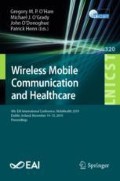Abstract
Usability tests play an important role in any kind of software, as they limit errors and misunderstandings. Especially in the growing market of medical applications it is indispensable, but time-consuming and expensive. In order to improve the quality of medical applications and remove obstacles for developers, a method has been developed that simplifies testing the usability of mobile medical applications and provides additional data on compliance and effectiveness. Because this test method is remote-controlled and asynchronous, finding examiners is simplified. It also allows more subjects to be found and more data to be collected. This increases user experience and achieves more natural results as study participants act in their natural environment. In order to decide whether the app developed is suitable for this remote testing method, a questionnaire was developed to assist in the decision-making process. The described method will be tested in a study.
Access this chapter
Tax calculation will be finalised at checkout
Purchases are for personal use only
References
Research 2 Guidance mHealth App Economics 2017/2018
Healthcare Information and Management Systems Society Promoting Usability in Healthcare Organizations: Initial Steps and Progress Towards a Healthcare Usability Maturity Model
Healthcare Information and Management Systems Usability Evaluation Guide for Clinicians Practice: https://www.himss.org/himss-emr-usability-evaluation-guide-clinicians-practices-9-essential-principles-software-usability. Accessed 14 May 2019
IOS Design Principles. https://developer.apple.com/design/human-interface-guidelines/ios/overview/themes/. Accessed 14 May 2019
Android Design Principles. https://www.designprinciplesftw.com/collections/android-design-principles. Accessed 14 May 2019
Stoyan, S.R., Hides, L., Kavanagh, D.J., Zelenko, O., Tjondronegoro, D., Mani, M.: Mobile app rating scale: a new tool for assessing the quality of health mobile apps. JMIR Mhealth Uhealth 2015 Jan-Mar, 3(1), E 27, p. 1
Ben Sheiderman’s Eight Golden Rules of Interface Design https://faculty.washington.edu/jtenenbg/courses/360/f04/sessions/schneidermanGoldenRules.html. Accessed 14 May 2019
UX Planet: Mobile UX Design: Key Principles https://uxplanet.org/mobile-ux-design-key-principles-dee1a632f9e6. Accessed 14 May 2019
The Startup, Mobile App Design Principles: 13 Rules for Creating Apps that Stick https://medium.com/swlh/infographics-mobile-app-design-principles-13-rules-for-creating-apps-that-stick-f607959692be. Accessed 14 May 2019
Lienhard, K.R., Legner C.: Principles in Design of Mobile Medical Apps: Guidance for Those who Care. University of Lausanne, Switzerland
MLSDev: Healthcare Mobile App Development: Types, Trends, & Features https://mlsdev.com/blog/healthcare-mobile-app-development. Accessed 14 May 2019
Albrecht, U.V.: Chances and Risks of Mobile Health (Chancen und Risiken von Gesundheits-Apps) (2016) Hannover, Germany (2016)
Nielsen, J.: Usability Engineering. Academic Press, Boston (1995)
Brooke, J.: SUS - a quick and dirty usability scale. United Kingdom (1986)
Sauer, J., Muenzberg, A., Hein, A., Roesch, N.: Simplify testing of mobile medical applications by using timestamps for remote, automated evaluation. In: 2019 15th International Conference on Wireless and Mobile Computing, Networking and Communications (WI Mob) (2019)
Laugwirtz, B., Held, T., Schrepp, M.: Construction and evaluation of a user experience questionnaire. In: HCI Usability Education, Work, pp. 63–76 (2008)
Brush, B.A.J., Ames, M., Davis, J.: A comparison of remote and local usability studies for an expert interface. In: CHI Vienna, Austria, pp. 1179–1182 (2004)
Thompson, K.E., Rozanski, E.P., Haake, A.R.: Here, there, anywhere: remote usability-testing that works. In: SIGITE 2004, pp. 132–137. ACM, USA (2004)
Hartson, H.R., Castillo, J.C., Kelson, J., Neale, W.C.: Remote evaluations: the network as an extension of the usability laboratory. In: CHI 1996, pp. 228–235 (1996)
Tullis, T., Fleischman, S., McNulity, M., Cinanchette, C., Bergel, M.: An empirical comparison of lab and remote usability-testing on web sites. In: Usability Professionals Association Conference (2002)
Dumas, J.C.: Usability evaluation from your desktop. In: Association for Information Systems (AIS) SIGCHI Newsletter, November 2003, pp. 6–8 (2003)
Elfert, P., Eichelberg, M., Tröger, J., Britz, J., Alexandersson, J., et al.: DiDiER digitized services in dietry counselling for people with increased health risk related to malnutrition and food allergies. In: IEEE Symposium on Computers and Communications (ISCC), pp. 100–104. IEEE (2017)
Muenzberg, A., Sauer, J., Hein, A., Roesch, N.: The use of ETL and data profiling to integrate data and improve quality in food databases. In: 2018 14th International Conference on Wireless and Mobile Computing, Networking and Communications (WI Mob), pp. 231–238 (2018). https://doi.org/10.1109/wimob.2018.8589081
Acknowledgment
This research was done within the framework of the DiDiER project, which is funded by the German Federal Ministry of Education and Research (grant 02K14A150). Different institutes are working together on this joint project. Particularly the German Allergy and Asthma Association (DAAB) as application partner and executor of the study and EUROKEY GmbH Saarbrücken, which took over many parts of the development of the app, are to be mentioned here.
The cooperation between the University of Applied Sciences Kaiserslautern and Carl von Ossietzky University was extremely positive and beneficial.
Author information
Authors and Affiliations
Corresponding author
Editor information
Editors and Affiliations
Appendix
Appendix



Rights and permissions
Copyright information
© 2020 ICST Institute for Computer Sciences, Social Informatics and Telecommunications Engineering
About this paper
Cite this paper
Sauer, J., Muenzberg, A., Siewert, L., Hein, A., Roesch, N. (2020). Remote Testing of Usability in Medical Apps. In: O'Hare, G., O'Grady, M., O’Donoghue, J., Henn, P. (eds) Wireless Mobile Communication and Healthcare. MobiHealth 2019. Lecture Notes of the Institute for Computer Sciences, Social Informatics and Telecommunications Engineering, vol 320. Springer, Cham. https://doi.org/10.1007/978-3-030-49289-2_1
Download citation
DOI: https://doi.org/10.1007/978-3-030-49289-2_1
Published:
Publisher Name: Springer, Cham
Print ISBN: 978-3-030-49288-5
Online ISBN: 978-3-030-49289-2
eBook Packages: Computer ScienceComputer Science (R0)

